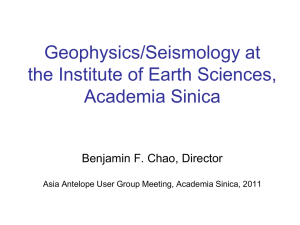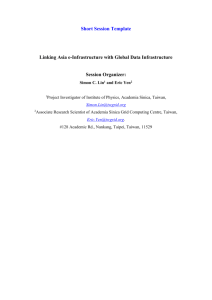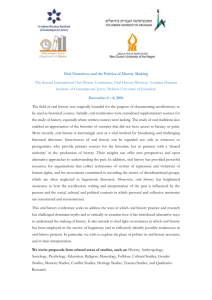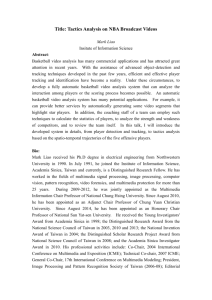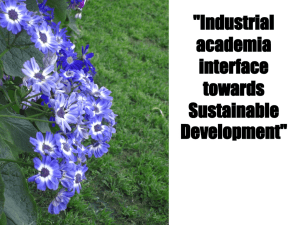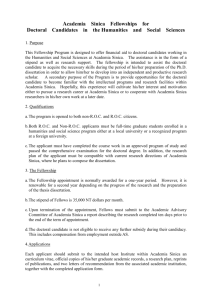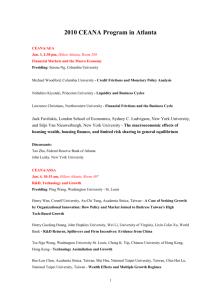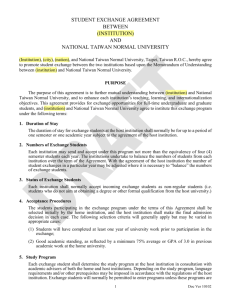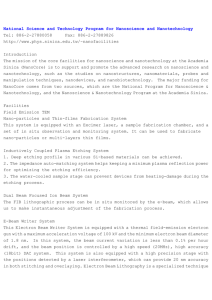More Information - Academia Sinica
advertisement
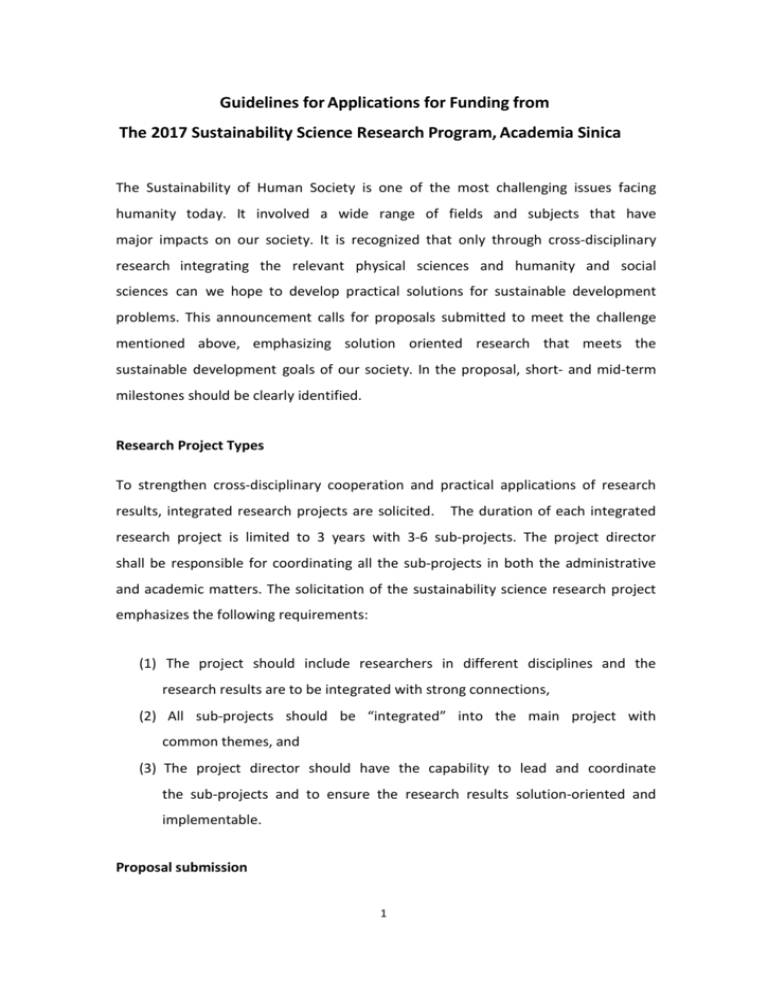
Guidelines for Applications for Funding from The 2017 Sustainability Science Research Program, Academia Sinica The Sustainability of Human Society is one of the most challenging issues facing humanity today. It involved a wide range of fields and subjects that have major impacts on our society. It is recognized that only through cross-disciplinary research integrating the relevant physical sciences and humanity and social sciences can we hope to develop practical solutions for sustainable development problems. This announcement calls for proposals submitted to meet the challenge mentioned above, emphasizing solution oriented research that meets the sustainable development goals of our society. In the proposal, short- and mid-term milestones should be clearly identified. Research Project Types To strengthen cross-disciplinary cooperation and practical applications of research results, integrated research projects are solicited. The duration of each integrated research project is limited to 3 years with 3-6 sub-projects. The project director shall be responsible for coordinating all the sub-projects in both the administrative and academic matters. The solicitation of the sustainability science research project emphasizes the following requirements: (1) The project should include researchers in different disciplines and the research results are to be integrated with strong connections, (2) All sub-projects should be “integrated” into the main project with common themes, and (3) The project director should have the capability to lead and coordinate the sub-projects and to ensure the research results solution-oriented and implementable. Proposal submission 1 Qualifications of Applicants (1) Project directors must be full-time employees of Academia Sinica at the level of Assistant Research Fellow or above; or faculty members from universities joining the Academia Sinica Degree Programs who are at the level of Assistant Professor or above, and jointly-appointed by Academia Sinica in the Academia Sinica Degree Program. In the latter case, it is required to add a fulltime employee of Academia Sinica as the co-director for the main project. (2) The Sub-project PI (Principal Investigator) must be at the level of the Assistant Research Fellows or above during the course of a project. (3) Within the project, at least one third of all sub-projects PIs must be research fellows of Academia Sinica. (4) Applicants can carry out a maximum of 2 projects funded by Academia Sinica (as the role of Project Director, Project Co-director, Sub-project PI and Subproject Co-PI). Proposal Review Process (1) Proposals for the sustainability science research projects will be reviewed in two stages. The first stage is for the concept proposals and the detailed proposals will be reviewed in the second stage. The review of the detailed proposals consists of four rounds: (i) initial peer review, (ii) secondary peer review, (iii) panel review, and (iv) budget and final review. (2) When funding is approved by the Sustainability Science Research Program, for a project, the project director and the sub-projects PIs will be asked to sign the “Agreement on Implementation of the Sustainability Science Research Program”. (3) Approved Research projects that involve experiments with biological material and genetic engineering must supply a letter of consent from the relevant IRB at the institute stating that the safety of the biological experiments to be conducted has been reviewed; projects involving animal or human experiments must supply a letter from the relevant institute stating that it 2 approves the proposed involvement of animals or human beings in the research. The 2017 Time Frame of the Program Late December, 2015 — Call for the submission of concept proposals Late January, 2016 — Deadline for submitting concept proposals Middle March, 2016 — Concept proposals reviewing Early April, 2016 — Officially inform the selected projects to submit the detailed proposals Middle May, 2016 — Deadline for detailed proposals submission June to August, 2016 — Initial reviewing (first round reviewing) August to September, 2016 — Submission of the responses to the reviewers’ suggestions and comments September to October, 2016 — Panel reviewing October to November, 2016 — Announce the final list of the approved projects. 3 2017 Focused Research Areas Energy and Decarbonization Technologies Facing threats from the global changes, the development of sustainable energy and carbon-reduction technology is one of the most pressing challenges to human society. With very little resources domestically, Taiwan is in extremely dire straits. Hence, it is urgent to strengthen the related research and development on innovative energy as well as decarbonizatoin technologies. The focused areas for research include: Energy Science and Technology (1) Solar Energy (2) Hydrogen Technology Development and Fuel Cells (3) Bioenergy (4) Geothermal Energy (5) Energy Storage Technology Improvement and Development Decarbonization Technologies (1) Carbon capture, storage and reuse (2) Other related issues Environmental Change and Human Well-being Climate change increases the frequency and severity of flooding caused by torrential rain that indirectly deteriorates the environment and public health. Heat effects, extreme weather events and environmental pollutions have significant impacts on viral infectious diseases (such as intestinal virus, dengue fever, etc.) and public health. Therefore, it is very important to develop management, monitoring, response and implementation systems to protect human welfare and public health. Meanwhile, hazardous substances generated by the growth of industry and business pollute people’s living environment. It is important to develop risk assessment and management techniques for hazardous substances. 4 The focused areas for research include: (1) Assess the Impact of Climate Change on Infectious Diseases and Public Health (2) Research and Implementation Strategies for Environmental Changes and Public Health (3) Toxicological Study, Management, and Environmental Risk Assessment for Hazardous Substances. (4) Other related issues Aging Society Increase in life expectancy and low fertility rate cause the ageing of world population. According to the UN report, in 2050 the world population over 65 years of age will be 2.5 times the population under the age of 4. It completely reverses the ratio in 1950. The CEPD (Council for Economic Planning and Development) estimates the ratio of Taiwan's elderly population will reach 20.6% in 2026. Pushing Taiwan into the rank of super-aged society. To understand the related issues and help the government make appropriate policies decisions to address the related social issues, the following focused research areas are needed. (1) Health and Welfare Issues of Aging Population (2) Population Policies on Aging Societies in Taiwan (3) The Requirement and Challenges in Long-Term Care for Elderly (4) Public Finance and Taxation Policies in the Aging Society (5) Other related issues Food Security According to the IPCC’s assessment reports, global warming, extreme weather, droughts and floods impact severely on agriculture . Food security and nutrition become an important issue as the world population grows. The key research areas include: (1) Climate Change and Food Security (2) The Adaptation Strategies for Taiwan’s Food Producing System to Address Climate Change and related Environmental-Social-Economic Impacts 5 (3) The Influences of Climate Change on the Production Capacity and Nutritional Values of Food Crops (4) Other Relevant Issues Ecological conservation and sustainable use of biodiversity resources The Convention on Biological Diversity in 1992 identified the following 3 goals to manage biodiversity resources: the conservation of biological diversity, the sustainable use of the components of biological diversity, and the fair and equitable sharing the benefits of the utilization of genetic resources. Taiwan has abundant resources of biodiversity. However, human activities and urbanization severely threat biodiversity resources. Moreover, the impact of exotic species on the native species and environment cannot be ignored. The key research areas include: (1) Eco-System Approach for Resource Management, Including the Balance of Water Resources and Stable Environment, Forests, Farmland, Wetlands Ecosystem (2) Fragmentation and Marginalization of Biological Habitat due to Urbanization, and Prevention of Deterioration of the Natural Environment and other related research (3) Assessment of the Influence from the Invasion of Exotic Species, the Risk Assessment and Management of its Impact on the Ecological Environment (4) Other Related Issues Management and Regulation of Food Safety In recent years, Taiwan has experienced several major food safety crises causing great panic to the public .It is important to enhance the public awareness of related issues, and provide practical recommendations to the Government to solve related problems. The focused research areas include: (1) Food Safety Maintenance, Emergency Response and Early Warning Systems (2) Food Safety Risk Analysis and Risk Management (3) Food Additives’ Management System and Operation (4) Other Related Issues 6 Human-dimensions of Sustainable Development The current trend of sustainable development emphasizes globe-scale applications and the Future Earth program has been promoted actively worldwide. Under the general direction of the ICSU, many countries in Asia have begun to co-design and collaborate on Future Earth in Asia program. Nearly eighty percent of Taiwan’s population live in urban areas. Balancing the development of urban and rural areas as well as modern and traditional cultural values will have major impacts on sustainable development of Taiwan. The focused research areas include: (1) The Influence of Cultural and Social Core Values on Sustainable Development in Taiwan (2) The Impact of Global Environment Changes on Urban Lifestyle, Consumption Patterns and Land Usage (3) Land-Use Planning and Housing Equity (4) Other Related Issues Adaptation Strategies and Management of environmental changes in Environmentally fragile areas (mountainous, outlying islands, etc.) About 70% of land in Taiwan is mountains Many aborigines have lived for generations in those areas with abundant natural resource, accumulating not only humanity and culture traditions but also rich biodiversity resources. The key research areas include: (1) The Impact of Protected Areas for Residents who Live in the Mountains and on Outlying Islands (2) Study the Role of Monitoring and Maintenance of Natural Resource and Conservation in Protected Areas (3) Study the Resources Governance in Mountainous areas and Outlying Islands (4) Other Related Issues New patterns of democratic governance and sustainable development In the Internet Era, Science Media have provided the public with easier and immediate access to participation in the discussion of public issues, leading sometimes to 7 populism. These new patterns of governance impact on the traditional representative democracy system. The key research areas include: (1) The Impact of New Patterns of Democratic Governance on Traditional Representative Democracy (2) New Decision-Making Model for Sustainable Development and the Environmental issues in the internet society (3) The Impact and Challenges of Globalization on the Governance of Sustainable Development (4) Other Related Issues 8
